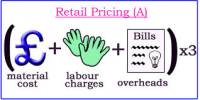Market sentiment is the general prevailing attitude of investors as to anticipated price development in a market. It refers to the overall attitude of investors toward a particular security or financial market. This attitude is the accumulation of a variety of fundamental and technical factors, including price history, economic reports, seasonal factors, and national and world events. It is the feeling or tone of a market, or its crowd psychology, as revealed through the activity and price movement of the securities traded in that market.
If investors expect upward price movement in the stock market, the sentiment is said to be bullish. The optimism or pessimism of the market players is most evident in the overall price trends. On the contrary, if the market sentiment is bearish, most investors expect downward price movement. Market participants who maintain a static sentiment, regardless of market conditions, are described as Perma bulls and Perma bears respectively. In broad terms, rising prices indicate bullish market sentiment, while falling prices indicate bearish market sentiment.
Market sentiment refers to the overall consensus about a stock or the stock market as a whole. It is usually considered as a contrarian indicator: what most people expect is a good thing to bet against. Market sentiment is used because it is believed to be a good predictor of market moves, especially when it is more extreme. It represents the mood of financial markets and the general feeling among traders, whether they trade foreign exchange, the stock market, or anything else. Very bearish sentiment is usually followed by the market going up more than normal, and vice versa. It is demonstrated through the price movements of the security in question.
Market sentiment is monitored with a variety of technical and statistical methods such as the number of advancing versus declining stocks and new highs versus new lows comparisons. Sentiment Analysis allows you to evaluate market sentiment, which will help you get potential directional signals about where the asset/market you are evaluating may be heading. A large share of the overall movement of an individual stock has been attributed to market sentiment. The most common reading of market sentiments is trading in tandem with prevailing market sentiments, which is an effective strategy for long-term investors. The stock market’s demonstration of the situation is often described as all boats float or sink with the tide, in the popular Wall Street phrase “the trend is your friend”.
















